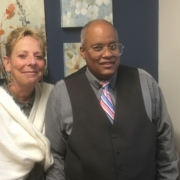Rebuilding The Direct Support Workforce: An In-Depth Conversation with NADSP’s Joseph Macbeth
By the time you read this, we’ll be marking nearly two years of the global pandemic. While no one’s lives and livelihoods are safe from the ever-present threat of COVID-19 and its variants, some professions have been stretched and stressed far beyond their limits. Frontline workers. Essential workers. Healthcare workers. Those members of our communities whose jobs demanded they show up on time, every day.
Like countless other essential workers, Direct Support Professionals – DSPs – also showed up when called, tirelessly addressing the needs of the disability community during a time of unforeseen national crisis. But unlike other healthcare workers, the U.S. Department of Labor does not recognize the Direct Support Profession with a Standard Occupational Classification. As a result, wages are low, turnover is high, and even as the need for DSPs grows, there’s little drive to create professional standards or establish career paths.
Whatever the excuses had been, Joseph Macbeth, President and CEO of the National Alliance of Direct Support Professionals (NADSP), is having none of it. The time is now, he believes, for DSPs to get the professional respect – and the opportunities – they’ve long deserved.
What Are DSPs, Anyways?
A DSPs role extends beyond the definition of those who ‘assist people with intellectual and developmental disabilities.’ DSPs are involved in all aspects of client support – aiding in independent problem-solving and decision-making, behavioral assessment, health and medication administration, life skills education, even crisis prevention. DSPs also offer assistance with the legal and human rights complexities clients face in their communities. This expansive yet unappreciated skill set makes a quantifiable difference every day for the disability community.
Today, there are approximately 4.5 million direct care workers in the U.S. – 1.3 million of whom are DSPs. They’re an increasingly diverse workforce comprising 87% women, 27% immigrants, and 59% people of color. While DSPs are earning recognition for diversity, significant issues around the perceived value of this workforce and culture remain, creating barriers to attracting the best talent. DSPs quickly burn out in many provider agencies due to overburdened expectations, non-competitive wages, and an absence of training to perform more skillfully in their jobs. Most professions have clear paths for career growth, but DSPs remain poorly undefined.
Keeping Those Good At Their Jobs Staying In Their Jobs
In leading the National Alliance of Direct Support Professionals (NADSP), Joseph Macbeth’s mission couldn’t be more straightforward; “The goal is to keep those who are good at their jobs staying in their jobs.” No small feat considering the substantial damage the Department of Labor’s refusal to grant Standard Occupational Classification on DSPs is having on employee retention within the human services community. “Imagine the government not recognizing the value of your work,” said Macbeth. “It demeans DSPs and the people they work so hard to support.”
Poverty-level wages are another inherent issue. Most DSPs are single mothers working two jobs, significantly contributing to the high turnover rate. “We don’t talk about turnover through the lens of human emotions and the impact it has on people,” explains Macbeth. “Most DSP turnover is discussed as quality and consistency versus the psychological impact it has on people.” Almost like clockwork, that turnover happens within three months. 550,000 DSPs – essentially 50% of the total employed – abandon their post per year, leaving, as Macbeth says, “emotional ramifications for all involved – the DSPs and of course, the care recipients.”
Elevating The Professional Status of DSPs.
Thirty years ago, Macbeth, fresh out of college and armed with a degree in psychology, stumbled into his first job in human services. “I started with no experience and was thrown into the “sink or swim” nature of this occupation,” remembers Macbeth. “But I never left the field because I got to know who I cared for, and those lasting connections deepened my direct support work.” Macbeth also connected with the support workforce, uncovering the extent to which the human services industry needed transformation to make direct support careers appealing and viable.
Founded in 1996 by a small group of professionals that included John F. Kennedy, Jr., the NADSP is the only national organization with the sole purpose of elevating the status of DSPs. “How did it ever become understood in our communities and places of power that this work just wasn’t as important as other types of human care work?” said Macbeth, asking an all-too-obvious question. “How do we change that dynamic and gain respect? Then, how do we advocate for more experiential learning and training, improved working conditions, and professional authority? The answer is for NADSP to look towards other healthcare workers who in past years raised their voices to cultivate professional standards and change the public’s perception of them, like nurses and social workers.”
Creating Systemic Change Within The Culture.
“Systemic change is never entirely external. It has to also come from within,” Macbeth is quick to add. “If the human services industry is serious about retaining DSPs, we need to change the culture around them.” Studies show one way for culture to develop is with employee training programs. “How do you develop the most critical workforce in the human services field? Anyone can come in and learn, but given the job’s intensity, training is needed,” explains Macbeth. “The deficiency in training access is the by-product of poor funding, yet training is necessary to reform practices, creating a discouraging loop.”
“For DSPs, the states set a low bar of required training for provider systems. The role of a Direct Support Professional needs to be seen as a practice. Practice competency is the result of resources, time, and training.” For Macbeth, “Paving paths towards professional recognition can only happen by establishing ethics and competencies, advocating with local and federal officials about this work, and obtaining a standard occupational code recognizing Direct Support Professional as a real and respectable job title.” As for providers, Macbeth feels their apathy towards training suggests “the business acumen of these organizations should be reviewed.”
Provider programs can also harbor micro-cultures created by frontline managers or long-term DSPs with questionable intentions and without a code of ethics to guide them. “A code of ethics would be a roadmap for DSPs – integrity and responsibility and the creation of training programs that are not academic but are more cognitive role-playing show a code of ethics by example,” Macbeth explains. “Unfortunately, some veteran DSPs pass their poor training onto new staff, creating a hierarchy around a flawed ‘check and balance’ model.” Macbeth is clear how common this leadership problem is and how it spurs a culture of mistrust. “We have so far to go to help organizations create this professional role, but also to help them understand the importance of positive workplace culture through supportive management teams.”
Of course, everything comes down to the question of money. During difficult financial periods, training sits at the very top of the care profession’s list of budget cuts—the domino effect of omitting continued education results in potential detriment to the system as a whole. Macbeth makes clear how the same standards and practices for other business sectors do not translate to DSPs, “Emotional development is needed regardless of the economy, and we know career paths work in other professions. The Direct Support Professional position is competency-based, and if we measure those and set these bars, we secure work and commitment.”
Building Bridges to Retention
The pandemic exposed far too many weak links in the healthcare industry, including the ongoing devaluation of DSPs and their pitiful job retention rates. While Joseph Macbeth agrees to recognize and to celebrate DSPs for their commitment to a complex specialization is valuable, “Our industry’s call to action should be building bridges to retention – keeping the workers hired now and creating paths for their future success.” Expanding training and certification-backed programs would establish vital career paths for DSPs, and affordable NADSP memberships can offer additional professional and personal support options.
…and finally, start showing DSPs the money. As Macbeth tells it, “The pandemic overburdened many DSPs emotionally and financially. Providers should offer bonuses and reward DSPs monetarily, especially those stuck by their organization over the last two years. Declining wages across the field make recruitment and retention enormously difficult.” While providers have minimal leeway in determining DSP salaries, states shouldn’t be funding both providers and their regulators. One way to bridge this gap would be to have independent accreditation focusing on person-centered practices and DSP development, determining appropriate compensation. “The hard truth is states need a new model for funding direct care,” said Macbeth. “Without one, the struggle to keep DSPs will continue.”
Real People Caring for Real People
Even as President and CEO of NADSP, Joseph Macbeth’s connection to DSPs and those they support remains just as strong as when he was that college kid who stumbled into his first human services job some thirty years earlier. “DSPs stay because of their love of the relationship with the people they bond with and support,” says Macbeth. “That’s the reason why I never left. Yes, I want to keep those who are good at their jobs staying in their jobs. But I also want DSPs seen by the public, peers, and politicians as essential workers doing important, noble work worthy of respect and a decent paycheck.”
As a megaphone for DSP advocacy, NADSP hosted its inaugural Advocacy Symposium in March of 2022, amplifying the voices of the DSPs through virtual training and meetings with congressional leaders to advocate for policy change.
“For the first time, direct support professionals, with help from self-advocates, family members, providers, and researchers were able to share their stories with members of congress from 43 states,” said Joseph Macbeth. “This is only the beginning because advocacy work never ends, but the first steps have been walked and I believe our advocacy efforts will one day lead to true, systemic change that will improve the lives of many”.
Statistics predict there may be 8.2 million direct care job openings between now and 2028. There’s no better time than now for DSPs to raise their voices and speak truth to power – for ourselves and the disability community we all support.










Leave a Reply
Want to join the discussion?Feel free to contribute!